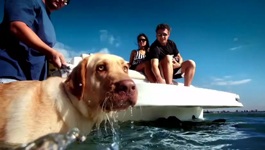Boating Lifestyle
Boating Lifestyle
There is so much to love, and learn, about boating. That's why we created this library of articles, videos and blog posts to help you throughout your adventures.
What to do when bringing your pet onboard
Q: What should I do before I bring my pet on board?
Get a checkup, make sure vaccinations are up to date, carry a signed vaccination certificate and or health certificate, get a stool test to check for worms, check for heartworm and make sure the dog is on preventative medication. Make sure nails are trimmed and pads are in good shape.
Q: What should I carry in my pet’s First Aid Kit?
- Ears: Panalog Ointment
- For Minor Scrapes: Panalog Ointment
- Eyes: Eye washes or artificial tears. Triple antibiotic ointment without cortisone
- Shampoo: Quality conditioning shampoo and crème rinse. When you can’t give your dog a real bath use waterless shampoo or grooming. Or sprinkle on some baking soda and brush.
- Hotspots: Panalog ointment
- Nails: Bring a nail trimmer
Q: What should I do if my dog gets seasick?
Once a dog gets sick it is too late to give pills. Start pills a day or two ahead. Begin with 1/4 of the adult dose of human remedies (Dramamine) and work upwards for individual pets. Pills may cause drowsiness and like with all human medications, double check with a veterinarian.
Q: How do I check for heatstroke and what should I do?
Rectal temperature is normally 101 to 101.5; temperatures of 105 to 106 can cause irreversible brain and nerve tissue damage. If this happens immediately immerse the pet in cold water and call your vet.
Q: What else should I do to prepare for boating with my pet?
While on the boat:
- Make sure the pet is always wearing a floatation device, preferably one with a handle so you can lift their head above water or help lift them out of the water.
- Make sure dog had identification or has been microchipped
- Put the pet’s bed or bedding in a quiet area.
- Carry a fresh water supply and keep water available at all times and avoid allowing your pet to drink the local water.
- Carry enough food to cover the trip plus a couple extra days. Limit the dog’s intake prior to the cruise. After 4-5 hours give your pet more food.
- Medications: Make sure to carry a supply of any medications that your pet may be on.
- Keep a long handled crab or fish net within grabbing distance on deck to retrieve small pets that fall overboard.
- For cats hang a strip of carpet overboard in case they go overboard. They may be able to grab onto it and climb back up.
- Exercise: Make sure your dog is exercised either by swimming or running around the deck. Bring floatable toys for the dog to play with and also chews.
- When on land never allow your pet to roam off leash, never allow your pet to go visit with a strange dog. Clean up and properly dispose of any feces.
Submitted by BOAT/US Magazine www.boatus.com


